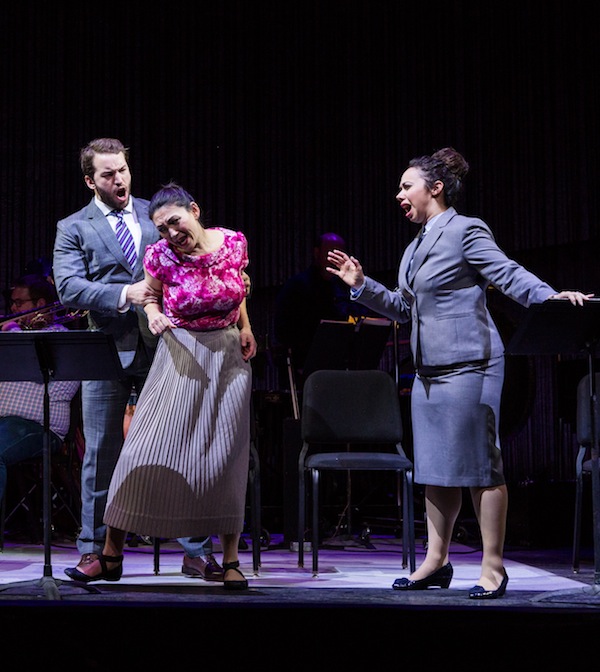WNO’s new operas offer mixed takes on the American experience

Michael Hewitt, Laura Choi Stuart, and Eliza Bonet in “Fault Lines” presented by Washington National Opera. Photo: Yassine El Mansouri
Washington National Opera presented three twenty-minute operas Saturday night at the Kennedy Center. Part of the company’s American Opera Initiative festival, the evening proved to be a riveting experience.
Each piece told a story that challenged audiences to question the core of American culture—from the complexities of family relationships to the meaning of life itself. The singers and orchestra brought each opera alive on the Terrace Theater stage, offering three distinctive experiences in an intimate environment.
The program opened with Nathan Fletcher’s A Bridge for Three. The plot is dark and deeply unsettling, telling the story of three figures from different centuries all of whom ponder leaping off the Brooklyn Bridge. Each performer–Alexander McKissick, Michael Hewitt and Eliza Bonet–sang with a clear, rich tone, projecting well throughout the theater. One could hear each character’s anguish in their voices, mirrored in their low, foreboding quality.
The orchestra both echoed and harmonized with the singers, alternating between open lyrical passages and mysterious musical interludes.
The music climaxed as the three characters prepared to jump, escalating in both pitch and dynamic. The orchestra sustained its low, menacing tone as the singers bode their farewells to the audience. It was a truly gripping moment that hung in the air well after the music subsided.
Yet the piece ends on a hopeful note. Bonet is saved, and sings sweetly of her humanity. It’s a resonant conclusion that invites listeners to question the nature of suicide, and the their own existence.
Gity Razaz’s Fault Lines opens with an anticipatory prelude in the orchestra, followed by a heated musical dialogue between Richard (Michael Hewitt, the town’s mayor) and Kyoko (Laura Choi Stuart, his housekeeper). Their conversation quickly escalates into dispute when Richard starts sexually teasing Kyoko and hinting at her dismissal as an employee. The orchestra reflects this push and pull, reacting with timpani rolls and spurts of tremolo in the strings as their interactions escalate.
The atmosphere turns tragic when the audience soon discovers that Richard raped Kyoko. Stuart sings tragically of his cruelty and her fear, powerfully projecting her character’s pain. Here her voice is pure and soaring, crafting a beautiful lyrical passage despite the disturbing content. A mini-climax occurs when Kyoko confronts Richard’s wife (Bonet), followed by the piece’s final height when the couple’s son, Harry (McKissick) stabs Kyoto.
Fault Lines is a powerfully depicted tale of deceit, heartbreak and passion, but with so many dramatic events in such a short period of time, the scenario feels over-the-top and inauthentic.
The final opera, Precida Park by John Glover, is about a family resettling after San Francisco’s devastating 1906 earthquake and one character’s search for peace within the chaos. Lilah (Alexandria Shiner) had a plan to form her own Walden-like community of peaceful living with her friend Gretchen. As her family (Stuart, Bonet, Frederick Ballentine and Hewitt) bickers and expresses extreme discontent in their new home, Lilah continuously interrupts the chaos with wistful wishes for Gretchen and hints at creating Walden.
Alexandria Shiner’s voice is stunning as she longs to create her own Walden. Her singing is musically nuanced and technically on-point, matching her idealism as she dreams of paradise.
Yet there are just too many unanswered questions. (Why are they relocating? Who in the world is Gretchen? And Walden itself seems like a huge idealistic stretch.)
Still, there are beautiful moments in Precida Park. The piano pulses steadily—almost Phillip Glass-like, creating a sense of urgency. The orchestra guides the emotional highs and lows of the piece, with the strings playing running scales in moments of anxiety, and slower, deeper-toned passages during more solitary times.
The curious depiction on the troubles of family life, intermixed with a longing for peace intrinsic to the human condition, make for a resonant work, despite its lack of dramatic cohesion.
Jamie McCrary is a writer, musician, and educator based in Washington, DC. As a journalist, she’s covered everything from science policy to statistics—though classical music is her specialty. She has written for the Curtis Institute’s Overtones Magazine; DCist, On Tap Magazine; NEA Arts Magazine, Connections Magazine, and Eat-Drink-Lucky. She holds a BM in viola performance and also maintains an active performing and teaching career.
